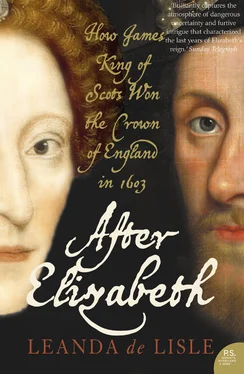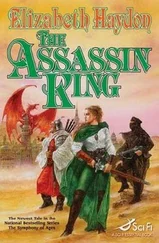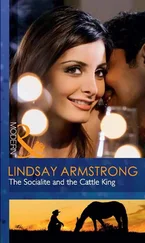Renewed efforts were being made to have the decision on Lord Beauchamp’s legitimacy reversed and the following year Sir Michael Blount, the Lieutenant of the Tower, was caught stockpiling weapons for Beauchamp’s father the Earl of Hertford in the event of Elizabeth’s death. The Earl was put in the Tower with his son. The Cecils and Hertford’s brother-in-law, the Lord Admiral, Charles Howard of Effingham (later the Earl of Nottingham), worked hard for their release, which came remarkably quickly in January.
Essex was by now firmly allied to James with whom he had been in correspondence since 1594. † The King’s candidature appealed to Essex on several levels. The first was that he was a man. Essex once voiced the view that ‘they laboured under two things at this court delay and inconstancy which proceeded chiefly from the sex of the Queen’. 45 Secondly James, unlike Beauchamp, was indisputably royal. Thirdly James disliked the Cecils, blaming Burghley for his mother’s death, and resenting his championship of Beauchamp’s cause; and lastly, but significantly, it was believed he could attract support from across the religious spectrum. James had already shown himself to be sympathetic to the Puritan cause. In 1590, for example, he had ordered that prayers be said in Scotland for those in England suffering for the ‘purity’ of religion. Catholics, meanwhile, saw James in terms of his being the son of Mary, Queen of Scots, whom they regarded as virtually a martyr. Some hoped that he might convert when he left Scotland and there was widespread belief amongst Catholics and Protestants that, at the very least, he would offer Catholics toleration. Harington observed that James had never been subject to a papal excommunication and ‘had no particular cause to persecute any side for private displeasure’. James’s accession, therefore, offered a golden opportunity to ‘establish an unity, and cease the strife among us if it be possible’. 46
Perhaps the most effective enemy of this vision of religious freedom came, however, from amongst the Catholics themselves: the former missionary Robert Persons. Since Campion’s death, Persons had risen to be Prefect of the English Jesuits and was usually resident in Rome where he was described as a courtly figure, of ‘forbidding appearance’. To Persons any Catholic hopes of toleration were a threat to the higher goal of a total restitution of Catholicism and he was now to use his talents as a brilliant propagandist to change the whole basis of arguments on the succession. In November 1595 a book entitled A Conference About the Next Succession to the Crown of England appeared in England published under the pseudonym ‘R. Doleman’. * It took advantage of the fact the Tudors had failed to assert the strict hereditary principle to claim that ‘ancestry of blood alone’ was not enough to gain a crown. A monarch should have all the attributes of honour necessary to majesty and, the book argued, there was no such candidate within the Tudor family. The Doleman book took advantage of every consideration ever raised against the Tudor candidates, crystallised popular prejudices and added new disqualifications. Readers were invited to reflect that in the Suffolk line, Beauchamp and Lord Derby had damaged their royal status by marrying the daughters of mere knights (the daughters of Sir Richard Rogers and Sir John Spenser respectively). 47 Beauchamp and Derby were, therefore, simply not royal enough to command respect. Of the senior Stuarts, Arbella was said to be of illegitimate descent because Margaret Tudor’s second husband, the Earl of Angus, had another wife living at the time their marriage, while James was disqualified under the Bond of Association. The book further argued that James’s Scots nationality made him a particularly undesirable choice – and here Persons had hit on a raw nerve.
Historically, Scotland was ‘the old, beggardly enemy’, and although the Scottish Reformation of 1560 had ended three centuries of armed conflict the English still despised their impoverished northern neighbour. 48 For many, the idea of a Scot becoming King of England suggested a ridiculous reversal of fortune. Doleman played up to these feelings, claiming that there was no possible advantage to England in joining with an impoverished country whose people were known for their ‘aversion and natural alienation … from the English’ and for their close ties with England’s Irish and French enemies: James would fill English posts with Scottish nobles and might even oppress the English with foreign armies.
Furthermore, Doleman warned, while some claimed that England and Scotland shared the same religion, the truth was that Scottish Calvinism was ‘opposite to that form which in England is maintained’, with its rituals and bishops. If James became king the nobility would find the church hierarchy torn down and themselves subject to the harangues of mere Church ministers. 49 His words echoed something the Earl of Hertford had once said of the Puritans: ‘As they shoot at bishops now, so they will do at the nobility also, if they be suffered.’ 50 The fact that episcopacy had been abolished in Scotland in 1593 added credence to the claims.
Having thus dismissed all the Tudor candidates as unworthy, the Doleman book announced that in seeking a successor to Elizabeth ‘the first respect of all others ought to be God and religion’. 51 If this seems a strange argument now it is worth remembering that the rights of the present royal family have been based on this premise since the reign of William and Mary. It held still greater force at a time when kings were believed to rule by divine right.
The Doleman book accepted that each faith would prefer to choose a monarch of their own religion, but it expressed no doubt that a Catholic choice would win through since Catholics were strengthened by the persecution ‘as a little brook or river, though it be but shallow … yet if many bars and stops be made therein, it swells and rises to a great force’. 52 It was a belief shared within the Protestant establishment. Even Walsingham had once observed that the execution of Catholics ‘moves men to compassion and draws some to affect their religion’. The book’s comments were not, however, designed to spread dismay amongst Protestants, so much as to attract the attention of Catholics. Doleman informed Catholics that they were not only bound to choose a Catholic candidate as a religious duty, they were also blessed with an excellent choice: Philip II’s favourite daughter, the Infanta Isabella Clara Eugenia. Her claim through her father (and thus Edward III) was strengthened by that of her mother, Elizabeth of Valois, a descendant of the Dukes of Brittany to whom William the Conqueror had pledged feudal obedience.
The book claimed Isabella also had the personal attributes necessary in a great monarch. She was ‘a princess of rare parts both for beauty, wisdom and piety’ and, as she came from a rich kingdom, she was less likely to ‘pill and poll’ her English subjects than a poverty-stricken Scot. 53 The arguments made the Infanta a powerful and believable candidate overnight. As a final touch Persons mischievously dedicated the book to Spain’s leading enemy at court: the Earl of Essex – he who had attracted such a large Catholic following. ‘No man is in more high and eminent place or dignity,’ Doleman wrote; ‘no man likes to have a greater part or sway in deciding this great affair.’
In his Tract Harington recalled that, as the pivotal year of 1598 opened, the English universities of Oxford and Cambridge ‘did both light on one question that bewailed a kind of weariness of the time, mundus senescit , that the world waxed old’. 54 The Privy Council was half the size it had been at the beginning of Elizabeth’s reign and Burghley was so old and ill he had to be carried into meetings in a chair. He still pursued the cause of peace with Spain without success and the costs fell on a country burdened by a growing population and a series of harvest failures. As food prices rose, wages fell, men impressed for the war returned to vagrancy and theft and sedition increased. There were reports of the poor claiming that Philip II of Spain was the rightful King of England and that life had been better under his wife Mary I. The greatest danger for Elizabeth, however, was the discontent at court.
Читать дальше












